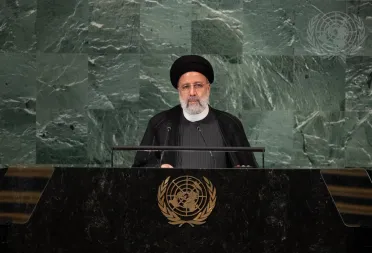Statement
Statement summary
SEYYED EBRAHIM RAISI, President of Iran, underscored his country’s fight against injustice and called for globalization of justice. Rejecting some of the double standards of certain Governments vis-à-vis human rights, he described unilateralism as a tool that has been used to hold many countries back. On a selective basis, the United States cannot accept that certain countries have the right to stand on their own two feet, he asserted. What is happening in Europe is a mirror image of what has been happening in Western Asia in the past few decades. It shows that the United States has pursued its own interests at the expense of many other countries. The Islamic revolution in his country was the beginning of the movement of the great nation of Iran to seek its own place in the world. However, Iran has been faced with coup d’état attempts, oppressive sanctions and hegemonic interventions. None of the successes of the Iranian nation have been acceptable to the great Power, he emphasized, recalling the time that Saddam Hussein tore up the Algiers accord and attacked Iran in an unprovoked manner, as well as the time when the United States trampled upon the nuclear accord.
The previous President of the United States announced that Islamic State in Iraq and the Levant/Da'esh (ISIL) was created by his country; for Iran, it makes no difference which Administration is responsible for the creation of the group. What matters is that a Government on the other side of the planet has decided to bring havoc and chaos to the region at the expense of the lives and blood of women and children, he said. The leader that descended into the arena of the fight against terrorism was General Qasem Soleimani, he recalled, describing his death as a “savage, illegal and immoral crime”.
Underlining that the history of Iran is that of a nation that has learned to not depend on anyone else, he said Iran has learned its lesson: despite announcing its neutrality during both World Wars, it was subject to foreign occupation. After the nuclear accord was signed and accepted within the framework of the Security Council, it was trampled upon unilaterally. Regardless of the oppressive sanctions, Iran has become a strong country with many impressive goals in the field of knowledge and technology, he stressed, pointing also to the attempt to bring a universal health-care coverage to 85 million people.
He underscored that war is not the solution to crises and called for dialogue and negotiations. Regional security must be born from within, not from the outside. In this context, he recalled that the region has not seen an occupying Power as savage as the Zionist regime, which has managed to form the world’s biggest prison in Gaza. The illegal settlements on Palestinian territory and the killing of Palestinian children show that seven decades of Israeli occupation and savagery has not ended.
He went on to elaborate on the double standards used to describe nuclear science capacities of Iran. Stressing that Iran is only pursuing peaceful endeavours, he said his country is not seeking to build or obtain nuclear weapons. Iran has been subject to 35 per cent of nuclear inspections while only 2 per cent of world nuclear activities are taking place in his country, he underscored, adding that it was the United States that left the agreement, not Tehran. Calling sanctions “a weapon of mass destruction”, he said “abiding by those is helping oppression take place”. The maximum pressure policy has suffered an embarrassing defeat, he asserted, adding that “the knot of the nuclear deal must be opened from the same place they managed to tie this knot together”.
Full statement
Read the full statement, in PDF format.
Photo

Previous sessions
Access the statements from previous sessions.
